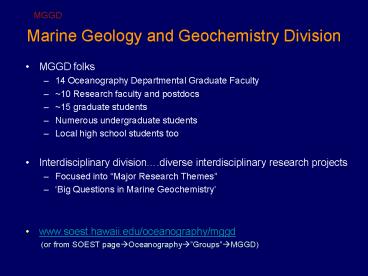Marine Geology and Geochemistry Division - PowerPoint PPT Presentation
Title:
Marine Geology and Geochemistry Division
Description:
MGGD: Major research thrusts and Big questions in Marine Geochemistry' ... What is the magnitude, character and impact of deep subseafloor biosphere? ... – PowerPoint PPT presentation
Number of Views:99
Avg rating:3.0/5.0
Title: Marine Geology and Geochemistry Division
1
Marine Geology and Geochemistry Division
MGGD
- MGGD folks
- 14 Oceanography Departmental Graduate Faculty
- 10 Research faculty and postdocs
- 15 graduate students
- Numerous undergraduate students
- Local high school students too
- Interdisciplinary division.diverse
interdisciplinary research projects - Focused into Major Research Themes
- Big Questions in Marine Geochemistry
- www.soest.hawaii.edu/oceanography/mggd
- (or from SOEST page?Oceanography?Groups?M
GGD)
2
Funding/Initiatives supporting MGGD Research
MGGD
- Coastal
- NSF OOI CoOP
- EPA BEACH
- NOAA ECOHAB IOOS Sea Grant
- Atmospheric Chemistry
- ONR Marine Aerosol Program
- NASA GTE
- Global Geochem Cycles and Paleoenvironments
- DoE (carbon cycling)
- NSF Ocean Acidification Ocean Carbon
Biogeochemistry dddddEocene
hyperthermals - GEOTRACES
- Subseafloor geochemistry and geomicrobiology
- NSF IODP RIDGE 2000 MARGINS
- NASA Astrobiology Institute
- Moore Foundation
3
MGGD Major research thrusts and Big questions
in Marine Geochemistry
- Biogeochemistry of Coastal Systems Nutrient and
Trace Metal Cycling, Ecosystem Dynamics, and
Human Impacts - How do land-derived material inputs and physical
oceanographic processes impact coastal
biogeochemistry and water quality? - How do changes in land use and nutrient input
impact coastal ecosystem structure and dynamics? - How do coastal ocean processes impact global
element cycles? - What are the effects of physical processes on
sediment-seawater exchange in coastal systems?
J. Cowen B. Glazer E. DeCarlo F.
Mackenzie K. Ruttenberg F. Sansone
4
MGGD Major research thrusts and Big questions
in Marine Geochemistry
- Marine Aerosols and Air-Sea Exchange
- How do aerosols influence climate?
- What are the key uncertainties in air-sea
exchange/fluxes/impacts? - How can we constrain marine sources and sinks,
and atmospheric transport?
T. Clarke D. Ho S.
Howell B. Huebert C. Measures
5
MGGD Major research thrusts and Big questions
in Marine Geochemistry
- Global Geochemical Cycles Contemporary to
Paleoenvironments - What are the human impacts on global elemental
cycles? - How will ocean acidification affect carbonate
production in marine organisms and carbonate
dissolution in reefs and sediments? - How can paleoclimatology help us understand and
predict contemporary global climate changes? - What are the roles of sediment geochemistry and
seafloor-ocean exchange in sinks/sources of
global elemental cycles?
E. DeCarlo T. Clarke B. Huebert
T. Li F.Mackenzie C.Measures K.
Ruttenberg J.Schoonmaker R. Zeebe
6
MGGD Major research thrusts and Big questions
in Marine Geochemistry
- Biogeochemical Cycling and Geomicrobiology at
MORs, Ridge Flanks, Hot Spots, and Subduction
Zones - How do hydrothermal geochemical fluxes impact
ocean chemistry? - How does fluid flow affect mass transport w/in
subduction zones? - What is the magnitude, character and impact of
deep subseafloor biosphere? - What is the impact of magmatic/tectonic events on
geochemical fluxes and microbial activity? - What do extreme environments tell us about
potential for life elsewhere in the universe?
J. Cowen B. Glazer M. Mottl and
M. Rappe G. Steward G. Wang
(HIMB) (Bio Ocean)
7
MGGD Major research thrusts and Big questions
in Marine Geochemistry
- Ocean observing technologies and applications
- Regional cabled observatories (HI coastal Kilo
Nalu JdFR flanks Neptune) - Non-cabled coastal observatories (Heeia
Fishpond CRIMP buoy) - Deep crustal (IODP-CORK) observatories (JdFR
flanks North Pond, MAR) - Ability to conduct adaptive sampling, and
remotely operated experiments and observations - Sampling and sensor technology
J. Cowen E. DeCarlo B. Glazer F.
Mackenzie K. Ruttenberg F. Sansone
8
(No Transcript)
9
(No Transcript)































